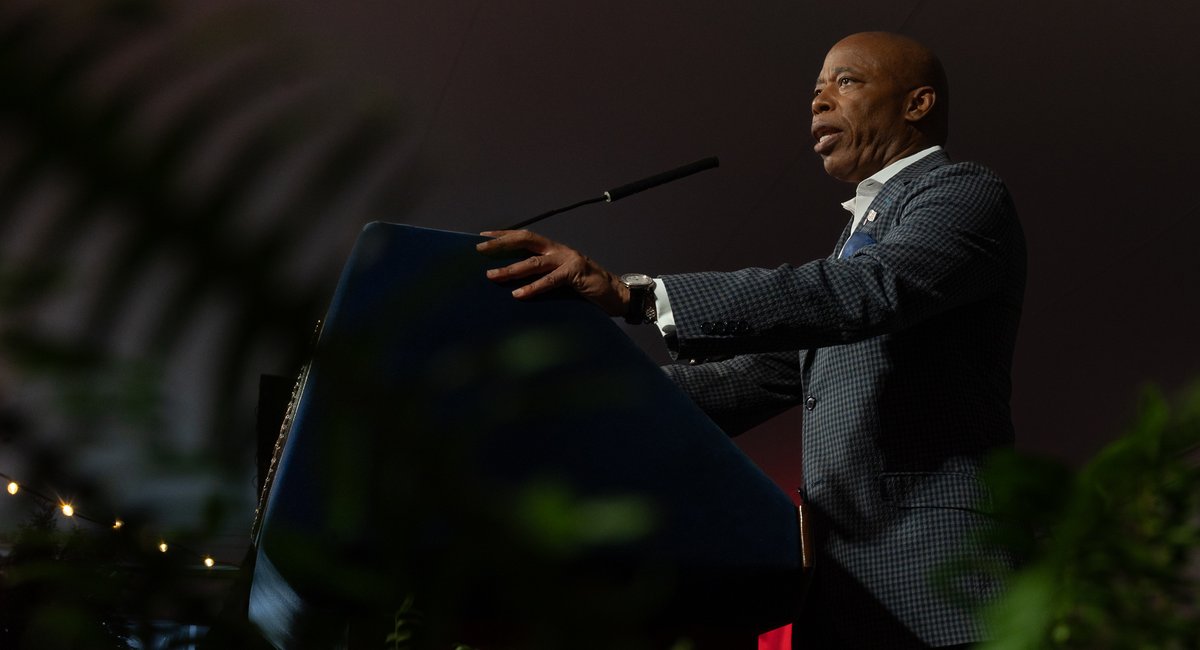A proposal to build specialized housing for formerly incarcerated people on a Bronx hospital campus is now on the verge of a City Council vote — three years after top city officials first unveiled the plan.
But the 83-unit housing development has lost a key ally: Mayor Eric Adams.
As he faces a tough re-election fight, Adams is backing down from the plan to build supportive housing for formerly incarcerated people with serious medical problems on the grounds of Jacobi Hospital. The proposed development has faced intense criticism from residents of the surrounding Morris Park neighborhood, including the sitting councilmember, since the Adams administration first announced it in August 2022.
The modest housing proposal is now the latest flashpoint in a fight between the mayor and the Council, leaving a few dozen apartments for New Yorkers in the balance.
The political dynamic is expected to play out in the open at a Council hearing scheduled for Thursday morning: Several councilmembers told Gothamist they would vote to approve the plan, despite opposition from local City Councilmember Kristy Marmorato. The final fate of the project is still unclear, but a vote in favor would break a long-standing Council tradition known as “member deference,” which allows individual councilmembers to wield ultimate power over land-use decisions in their districts. An Adams-appointed commission is attempting to neuter the custom through proposed changes to the city’s governing charter.
City Hall counters that the Council delayed the hearing for so long precisely because of Marmorato’s opposition.
The city’s Health and Hospitals Corporation owns the site and greenlit the plan in January 2024. Under the proposal, the nonprofit Fortune Society would operate 58 units of supportive housing and provide on-site services for people leaving Rikers Island with severe medical problems, like late-stage cancer and congestive heart failure, inside a now-vacant building. The plan also includes another 24 units of affordable housing for people earning no more than $68,000 a year, and an apartment for a superintendent.
At a community meeting in July 2024, Adams defended the plan against a barrage of criticism from Morris Park residents who said they feared living near single men with criminal histories and told him the apartments should be built somewhere else.
“This is what we hear everywhere,” Adams said of the opposition. “The hardest placement we have in the city is for single adult males. No one raised their hands and said, ‘Hey, Eric, bring them here.’”
He told the crowd that the men would be best served “in a setting where they can get the wraparound services they need so they don’t become reoffenders.”
But Adams’ First Deputy Mayor Randy Mastro has recently worked to block or alter the plan, which the Daily News first reported. Mastro, who was also instrumental in killing a long-planned affordable housing development on the site of the Elizabeth Street Garden in June that once carried Adams’ support, referred Gothamist’s questions to City Hall spokesperson William Fowler, who now says the Jacobi campus might not be the correct setting.
“We remain committed to providing such housing and are working to identify locations, here or elsewhere, to do so,” Fowler said. He also derided the Council for waiting nearly two years since the hospital agency approved the project to hold its hearing.
Marmorato, a Republican who represents the site and campaigned on killing the supportive housing plan, did not respond to requests for comment.
Many of her colleagues pounced on City Hall’s new stance, calling it “hypocritical” and saying they would vote to approve it if given the chance, despite Marmorato’s opposition.
“We have a lot of people who have interacted with the criminal justice system and who are in poor health and who deserve housing,” Councilmember Sandy Nurse, a Brooklyn Democrat, said in an interview. “My sense from a lot of members is they were planning to support this for a very long time.”
A 2022 analysis by the Corporation for Supportive Housing found that about 2,500 people who are arrested and sent to Rikers each year are homeless with mental illness and would benefit from supportive housing, but that too few units are available to them.
If the Council approves the plan, it could counter a long-held narrative that it rejects housing proposals that individual members oppose.
Council spokesperson Rendy Desamours criticized the mayor’s about-face.
“Mayor Adams and Randy Mastro are operating behind the scenes to block housing, just like they did when taking away affordable housing for seniors at Elizabeth Street Garden,” Desamours said.
Fortune Society President and CEO Stanley Richards declined to discuss the project and instead issued a written statement urging lawmakers to support the plan.
“This proposal would bring safe, supportive, and permanent housing to formerly incarcerated persons with complex medical needs who would otherwise experience homelessness,” Richards said. “It would also provide affordable homes for local community members at a time when rents are skyrocketing and supply is limited.
“Whatever the outcome, an array of Bronx civic groups are still mobilizing to oppose the plan. The Bronx Republican Women’s Club has circulated a flier on social media urging residents to attend the Council hearing and offering bus rides to City Hall for a protest on Thursday morning.
“Rikers Island is coming to Jacobi Campus!!!” the flier reads, while touting an alternative plan for housing reserved for “senior citizens, staff and veterans.”
And Lori Peterson, a Morris Park Community Association board member, said she and her neighbors fear living near people recently released from jail.
“It’s in a residential neighborhood, that’s our main concern,” Peterson said. “It’s a safety issue.”
